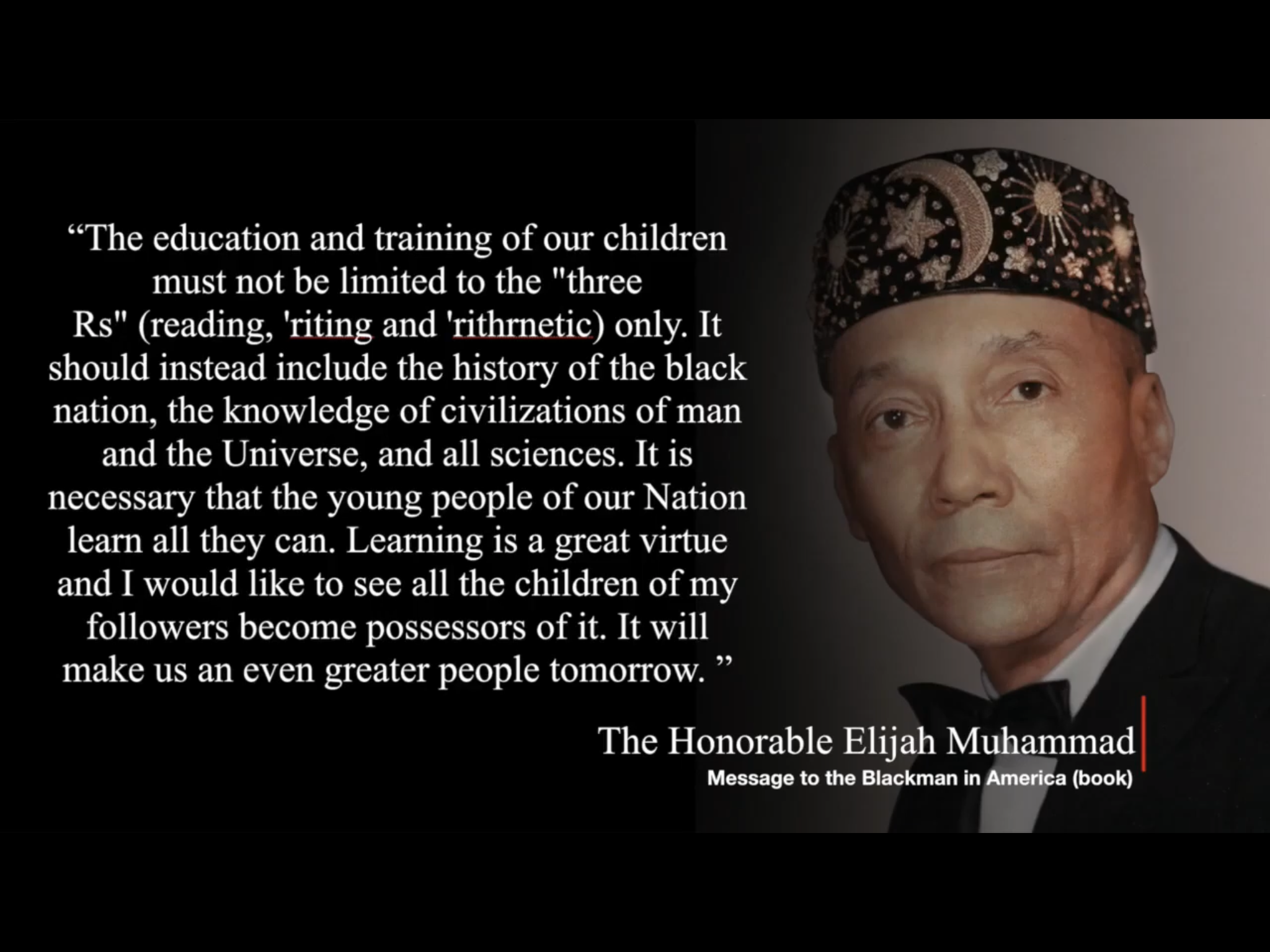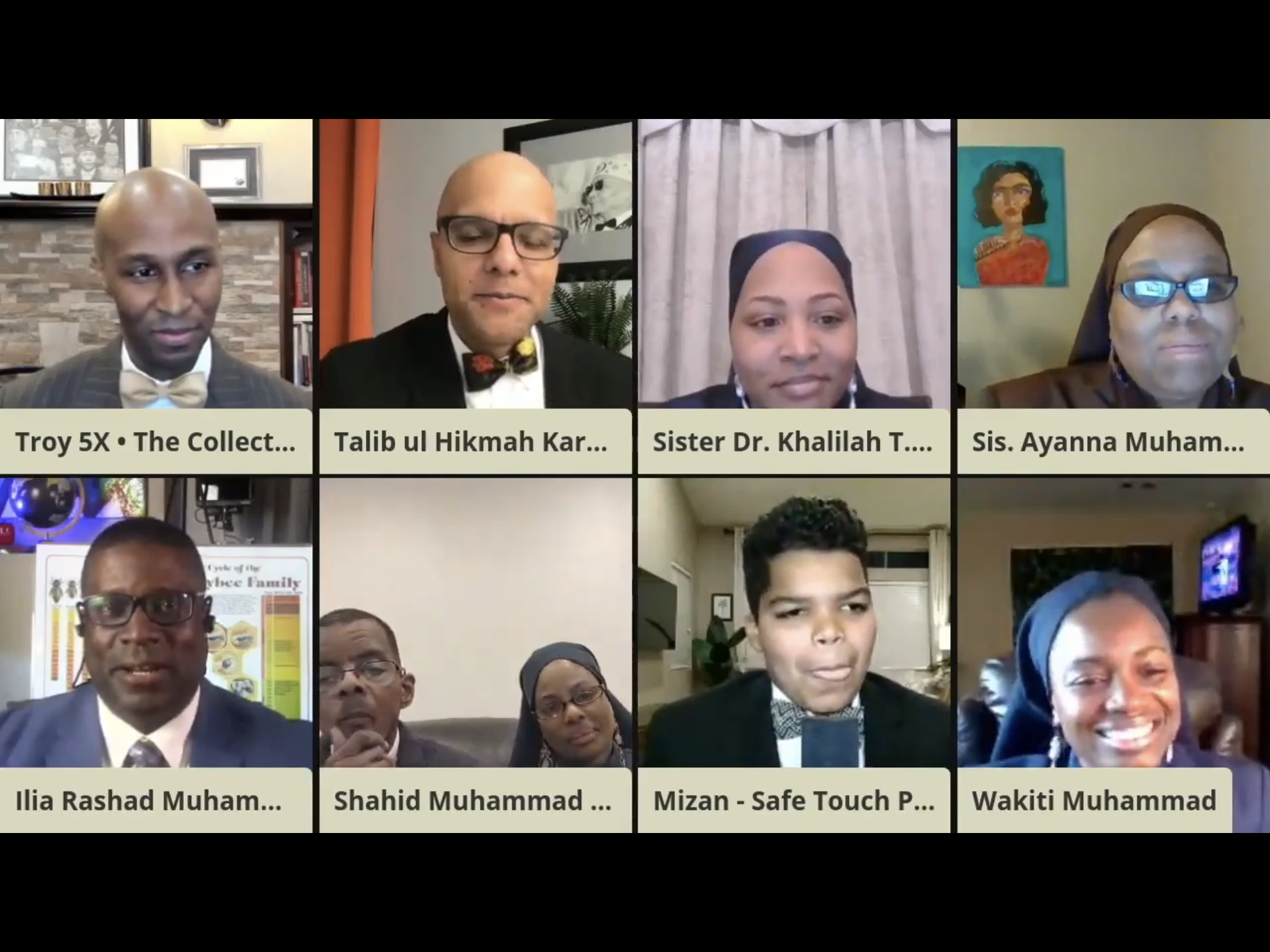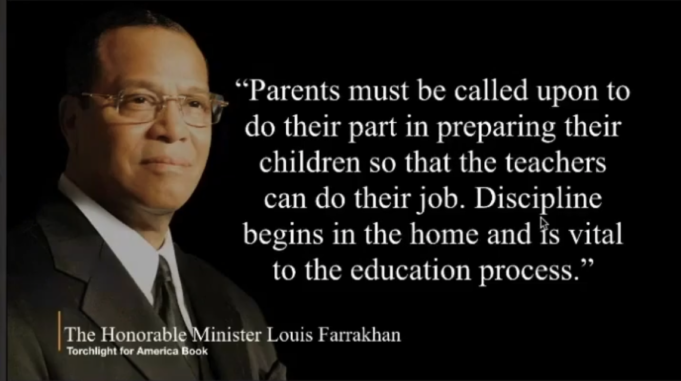by Donna Muhammad Contributing Writer @sisterdonna
“We don’t want to have a ‘word’shop, this is a ‘work’shop.” These were the opening words from moderator Talib Ul Hikmah Karriem, acting director of Muhammad University of Islam (MUI) in Chicago and businessman, during the Ministry of Education workshop delivered at the Nation of Islam’s first ever Virtual Saviours’ Day event, February 26.
“Master Fard Muhammad sparked and ignited a new educational paradigm. He gave to us new knowledge, new wisdom, new understanding, and revelation. He gave to us an invincible truth,” said Brother Talib Karriem.
Under the title, “Education for Life,” the workshop took its theme from the words of the Honorable Minister Louis Farrakhan: “If a curriculum does not prepare a student for life itself, then it is a worthless curriculum.”
Among the panel of educators tackling this important issue of a meaningful curriculum was Mizan Rupan, a 13-year-old programmer, creator, and inventor of the Safe Touch Pro Handle, from the San Francisco Bay Area. Drawing upon his love for tinkering and the environment created by his previous MUI instructors and his homeschooling parents, Bro.
Mizan developed his product on a 3D printer when he saw his family struggle to safely open doors amid the current Covid-19 pandemic. He served as an example, on the panel, as to what a child is capable of producing when given a curriculum and the freedom conducive to facilitating creative growth.

Additional panelists included long-time educators and husband and wife team Shahid Muhammad (affectionately known as the Math Doctor), an MUI mathematics instructor and CEO of MathDr., and Shahidah Muhammad, directress of Muhammad’s Mathematics, Science and Engineering Academy;
Dr. Khalilah T. Muhammad, assistant professor at Olive-Harvey College and writer; Troy 5X, educator and CEO/founder of The Collective 9; Ayanna D. Muhammad, educator, tutor and homeschooler; Wakiti Muhammad, co-founder of Elevated Places School and CEO of the Teacher CEO Project and Ilia-Rashad Muhammad, educator, NOI Research Team member, author and beekeeper.
In the course of the two hour workshop, panelists discussed subjects that are underrated, cut from public school programs or never included in curriculums such as art, music, cursive writing, land acquisition, agriculture, vocational skills such as carpentry, building sciences and character and moral development, How to Give Birth to a God, and the life skills students learn from these subjects.
“It is important to apply what you learn. Theory, alone, won’t help,” said Bro. Mizan. “For example, when I was younger, I wanted to build a computer. I didn’t just read about computers, my parents actually made me build one. I remember the trial and error and the experience I gained by building my own computer; by getting parts that weren’t compatible with other parts,” he explained.

This process helped Bro. Mizan understand, gain experience in the field of technology,” he said. “Another thing was that I didn’t just read science, my mom purchased science kits I built every week. There is a STEM (Science, Technology, Engineering and Mathematics) toy called Snap Circuits which showcases how a circuit board works, for younger children. I remember, every week, doing a project off of that. So that’s how I believe that experience is an underrated skill and is not offered by most schools.”
In discussing underrated skills, Bro. Shahid Muhammad, drawing from the Self-Improvement Study Guides, went to the root of life in the educational sphere.
“The Honorable Minister Louis Farrakhan teaches us, in Study Guide No. 2, ‘Building Human Potential,’ that our goal in life is to become one with Allah (God),” he said. “Proper education should provide the student with what is needed to become one with Allah.
So, the proper education should provide the student what is needed to become a god. Now put that on the list. Proper education should teach the student wisdom that enable the student to make sound, critical, rational decisions to navigate life successfully,” added Bro. Shahid.
“Then we have to teach civilization. Civilization is that key part of life that teaches knowledge, wisdom, understanding, culture, refinement and is not savage. Pursuit of happiness.”
A robust dialogue also took place regarding the impact of the pandemic on the educational system and the often-overlooked positive side-effect of returning the child to the authority and influence of the parent once again. “You always have to remember that the educational system is not our own and so everything that the educational system has been doing has been,
really, to separate you from your children and now that Allah has broken that education and placed your children back in your life, you now have to make an adjustment and the truth be told, you were supposed to always be there, but school has removed you because, in truth, you were the power all along.

Just like the welfare system, they make you lean on them, they make you dependent upon them and then they snatch the rug from underneath, and the same things is happening today. You have been made to believe that you have nothing to do with the learning of that little baby you gave birth to,” said Ayanna Muhammad. She explained how, as a result of being home now, many of the parents have come to the realization that their children can’t read or write or are failing basic subjects.
Takiyah Muhammad, 23, of Memphis, Tenn., a registered nurse, wife and expecting mother, was excited about the information presented during the workshop. “It gave me a working list of what subjects and curriculum I should learn more about in order to help raise up and educate my unborn son,” she exclaimed.
The workshop closed with a call-to-action for educators and others with varying skillsets to become a part of a National Curriculum Development Team and Education Resource website. The relaunch of the Mother Tynnetta Muhammad Scholarship for Fund for Sisters was also announced. Visit www.muichicago.org or www.thecollective9.org for more information.













